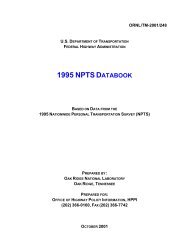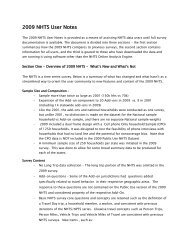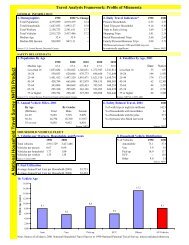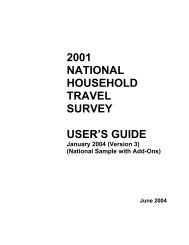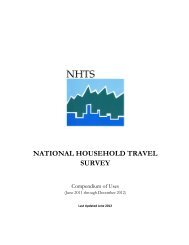Uses of National Household Travel Survey Data in - NHTS Home ...
Uses of National Household Travel Survey Data in - NHTS Home ...
Uses of National Household Travel Survey Data in - NHTS Home ...
Create successful ePaper yourself
Turn your PDF publications into a flip-book with our unique Google optimized e-Paper software.
Policy and Mobility<br />
Equity Implications <strong>of</strong> Replac<strong>in</strong>g Federal Fuel Taxes with Per-Mile User Charges<br />
Authors:<br />
Weatherford, Brian Anthony<br />
Transportation Research Board - 500 Fifth Street, NW Wash<strong>in</strong>gton, DC 20001<br />
TRB 90th Annual Meet<strong>in</strong>g Compendium <strong>of</strong> Papers DVD<br />
Transportation Research Board 90th Annual Meet<strong>in</strong>g<br />
2011<br />
Abstract:<br />
Policy makers have begun to consider replac<strong>in</strong>g state and Federal fuel taxes with per-mile user charges,<br />
also referred to as “VMT fees.” VMT fees would be more f<strong>in</strong>ancially susta<strong>in</strong>able and more closely l<strong>in</strong>k<br />
actual use <strong>of</strong> the transportation system to the costs <strong>of</strong> ma<strong>in</strong>ta<strong>in</strong><strong>in</strong>g and expand<strong>in</strong>g it. This paper uses data<br />
from the 2001 <strong>National</strong> <strong>Household</strong> <strong>Travel</strong> <strong>Survey</strong> (<strong>NHTS</strong>) and a simple OLS regression methodology to<br />
exam<strong>in</strong>e the potential social equity implication that such a change <strong>in</strong> the tax structure might cause. At the<br />
national level, a VMT fee would be less regressive than fuel taxes are, suggest<strong>in</strong>g that a VMT fee would<br />
be a more socially equitable way to <strong>in</strong>crease fund<strong>in</strong>g <strong>of</strong> the transportation system. However, replac<strong>in</strong>g<br />
fuel taxes with a VMT fee designed to be completely revenue neutral resulted <strong>in</strong> a net social welfare loss<br />
<strong>of</strong> $1.9 billion. Other vertical equity implications were modest but there were disproportionate horizontal<br />
equity impacts among low <strong>in</strong>come households. Low <strong>in</strong>come retired households were made relatively<br />
better <strong>of</strong>f than other low <strong>in</strong>come households while low <strong>in</strong>come s<strong>in</strong>gle parent households were made<br />
significantly worse <strong>of</strong>f.<br />
Subject areas and Index Terms<br />
F<strong>in</strong>ance; Highways; Policy; I10: Economics and Adm<strong>in</strong>istration<br />
Demographics; Equity (Justice); F<strong>in</strong>ance; Fuel taxes; Mathematical models; Socioeconomic factors;<br />
Transportation policy; User charges; Vehicle miles <strong>of</strong> travel; Mileage-based user fees<br />
Availability: Transportation Research Board Bus<strong>in</strong>ess Office<br />
22



